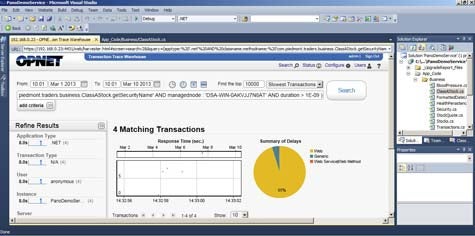Gaining real visibility into application performance has always required correlating various sources of infrastructure and application data. The trouble is that not only is that a time-consuming task, it generally involves playing several rounds of the blame game before anybody can figure out what the real source of the problem actually is. Riverbed Technology is […]
Gaining real visibility into application performance has always required correlating various sources of infrastructure and application data. The trouble is that not only is that a time-consuming task, it generally involves playing several rounds of the blame game before anybody can figure out what the real source of the problem actually is.
Riverbed Technology is moving to reducing the time it takes to figure out what might be wrong with any given application with the release today of Riverbed OPNET AppInternals Xpert 8.5, which is based on application performance management (APM) technology that Riverbed gained when it acquired Opnet Technologies at the close of last year.
According to Dimitri Vlachos, vice president marketing for the Riverbed Performance Management Business Unit, the goal is to unify Riverbed’s existing infrastructure performance management and application delivery controller (ADC) products with APM software in a way that gives organizations a unified view of the entire IT environment.

New features being added to the Opnet offering include tighter integration with integrated development environments (IDEs) that allow developers to discover potential issues before applications are put into production; support for both real-user monitoring in addition to synthetic application transaction testing; and a Transaction Trace Warehouse that allows organizations to analyze massive amounts of machine data to discover complicated performance issues.
The Transaction Trace Warehouse, says Vlachos, represents one of the first instances where Big Data techniques are being applied to APM.
Vlachos says the driving goal behind Riverbed’s push into the APM category is to help foster the development of inter-disciplinary IT teams that have a singular focus on performance management. That approach should not only result in better performing applications by eliminating the so called “DevOps” crisis, it should eliminate the massive amount of time IT organizations waste trying to identify problems every time there is a performance issue.
Regardless of the approach, it should be pretty clear to everyone that having IT professionals standing around pointing fingers at one another every time there is a problem is not conducive to productivity. Allowing that to continue not only ultimately saps the morale of the IT organization, it makes the IT organization appear to be a house divided that doesn’t know what it’s really supposed to be doing.
MV
Michael Vizard is a seasoned IT journalist, with nearly 30 years of experience writing and editing about enterprise IT issues. He is a contributor to publications including Programmableweb, IT Business Edge, CIOinsight and UBM Tech. He formerly was editorial director for Ziff-Davis Enterprise, where he launched the company’s custom content division, and has also served as editor in chief for CRN and InfoWorld. He also has held editorial positions at PC Week, Computerworld and Digital Review.









